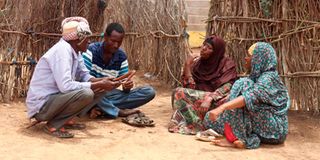War at home: Men in Tana River seek safe haven, find none

Male victims of gender-based violence during a counselling session in Hola, Tana River County.
What you need to know:
- Men also deserve a platform and empowerment programmes, activist says.
- GBV activist Ralia Hassan says four out of 10 men in the community are experiencing violence at home.
Gedi Farah has become a refugee in his own home; only guaranteed of peace if he brings food.
The 55-year-old father of six has quietly endured physical abuse from his wife and escaped death as many times as he can remember.
“I have been beaten with firewood and at times with sticks, she has even attempted to slaughter me using a machete, several times but I escaped,” he says.
The old man has witnessed sufficient grace in the past few months living with a wife who suddenly became wild. His predicament started in May in the wake of the Covid-19 pandemic.
Having lost most of his livestock in the 2019 floods menace in Tana River, Mr Farah was left with little to manage.
He then got into the charcoal business but ran into conflict with Kenya Forest Service officers in March 2020, and was fined more than Sh15,000.
“I had to sell my few goats even though my wife did not approve of it. I, however, had no choice since my freedom was more important,” he narrates.
Back at home, they had nothing more to depend on and both were forced to find other means to survive.
Endless beatings
From then on, his wife became hostile, denying him food whenever he brought nothing home.
On the few occasions that he did manage to get some food, he would only be served after the children and his wife had had their fill. Any effort to confront the matter ended in violence.
“I tried to call in the elders to address the issues I was facing, but they failed and left me to resolve it my way,” he says.
When the beating became too much, Mr Farah fled for safety to a place where a friend showed him; a small hut far from the village where men seek solace when depressed.
“I was there for a few months, but I came back after a friend called me for a small job. So, of late, I have been bringing food to my home and then retreat to isolation afterwards,” he says.
Komora Boru is also striving to ensure peace in his life. After his wife burnt him with cooking oil over a small disagreement, he retreated to the isolation home but has since returned to the village.
During these moments of solitude, he found peace in silence. He has now resorted to a quiet life even in the face of tribulations from a cruel wife.
Men's welfare
“We used to have a voice as men, but lately, women are in control. Any attempt to defend yourself earns you a jail term,” he says.
Mr Boru does not want to end up like his father who was killed by his second wife in a fierce fight in 2008, neither does he wish to go to jail like his cousin, over gender-based violence (GBV).
He hopes his silence will buy him a longer life, to see another dawn after Covid-19.
He says the government needs to look into the welfare of men aged between 35 and 60 as they are currently suffering violence amid the pandemic.
“We are the ones carrying the biggest burden. We are raising the youth and taking care of the elderly, yet we have been ignored in government plans," he says.
GBV activist Ralia Hassan says four out of 10 men in the community are experiencing violence at home.
She notes that because men tend to keep silent in the face of such atrocities, a large number of them suffer from depression and eventually commit suicide.
Violence against men
“Women have carried the empowerment tag to extreme levels, they are wrongly using the government protection to their advantage, hence abusing innocent men,” she says.
As a result, Ms Ralia says the society is losing its masculinity and the traditional leadership hence, distorting the traditional outfit of a family.
She says men also deserve a platform and empowerment programmes to raise a stable community.
Tana River County Commissioner Mbogai Rioba has now appealed to elders to help uphold the values of a society.
According to Mr Rioba, just like violence against women is denounced and considered a crime, the elders should take equal measures towards violence against men.
“Men need to come out and speak up. It does not mean you are weak, but creates room for dialogue towards a solution that may be of help to others,” he says.
Nevertheless, the county boss warns that the administration is on high alert and watching out for all forms of domestic violence for necessary action.





